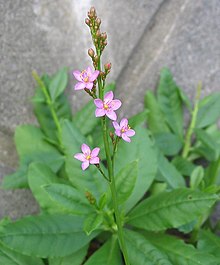Talinum fruticosum
| Talinum fruticosum | |
|---|---|

| |
| Scientific classification | |
| Kingdom: | Plantae |
| Clade: | Tracheophytes |
| Clade: | Angiosperms |
| Clade: | Eudicots |
| Order: | Caryophyllales |
| Family: | Talinaceae |
| Genus: | Talinum |
| Species: | T. fruticosum
|
| Binomial name | |
| Talinum fruticosum | |
| Synonyms[1] | |
|
Portulaca fruticosa L. | |
Talinum fruticosum is a herbaceous perennial plant that is native to Mexico, the Caribbean, West Africa, Central America, and much of South America. Common names include Ceylon spinach,[2] waterleaf, cariru, Gbure, Surinam purslane, Philippine spinach, Florida spinach, potherb fameflower, Lagos bologi, sweetheart, and Kutu bataw in Ghana from the Akan language[1] It is widely grown in tropical regions as a leaf vegetable.
Description
The plant grows erect, reaching a height of 30 to 100 cm (12 to 39 in). It bears small, pink flowers and broad, fleshy leaves.
Uses
As a leaf vegetable, T. fruticosum is rich in vitamins, including vitamins A and C, and minerals such as iron and calcium [citation needed]. Because it is high in oxalic acid, consumption should be avoided or limited by those suffering from kidney disorders, gout, and rheumatoid arthritis [citation needed]. It is cultivated in West Africa, South Asia, Southeast Asia, and the warmer parts of North and South America. Along with Celosia species, T. fruticosum is one of the most important leaf vegetables of Nigeria. In Brazil it is grown along the banks of the Amazon River, and is consumed mainly in the states of Pará and Amazonas.
Gallery
-
Talinum fruticosum in Singapore
-
Talinum fruticosum in India
-
Talinum fruticosum with buds
References
- ^ a b "Talinum fruticosum". Germplasm Resources Information Network. Agricultural Research Service, United States Department of Agriculture. Retrieved 2010-08-03.
- ^ NRCS. "Talinum triangulare". PLANTS Database. United States Department of Agriculture (USDA). Retrieved 7 December 2015.
External links
![]() Media related to Talinum fruticosum at Wikimedia Commons
Media related to Talinum fruticosum at Wikimedia Commons
![]() Data related to Talinum fruticosum at Wikispecies
Data related to Talinum fruticosum at Wikispecies



